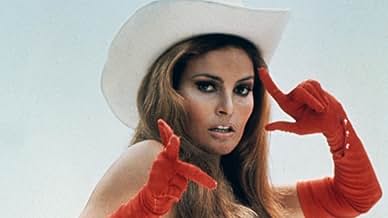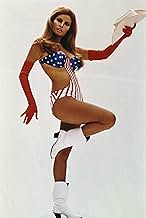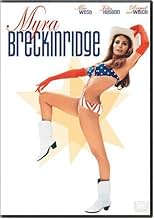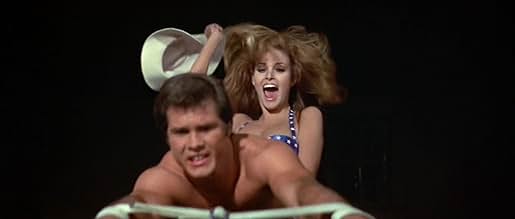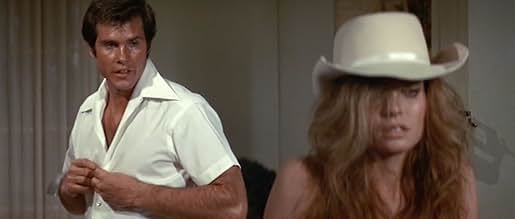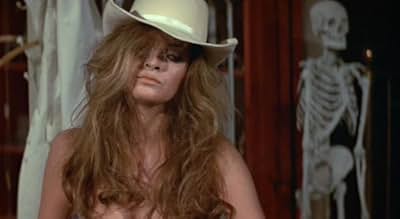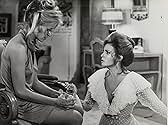IMDb RATING
4.5/10
3.7K
YOUR RATING
After undergoing gender reassignment surgery, an aspiring actress travels to Hollywood, where she also wants to make a claim on her wealthy uncle's estate.After undergoing gender reassignment surgery, an aspiring actress travels to Hollywood, where she also wants to make a claim on her wealthy uncle's estate.After undergoing gender reassignment surgery, an aspiring actress travels to Hollywood, where she also wants to make a claim on her wealthy uncle's estate.
Robert P. Lieb
- Charlie Flager, Sr.
- (as Robert Lieb)
- Director
- Writers
- All cast & crew
- Production, box office & more at IMDbPro
4.53.6K
1
2
3
4
5
6
7
8
9
10
Featured reviews
WHAT'S SO BAD, IT'S GOOD?
If you go into this exercise in wretched excess expecting a profound viewing experience, you'll be very upset. Part "Blazing Saddles", part "Love American Style", and part "Candy", this film is a tasteless melange of all that was mediocre about late 1960s filmmaking-- cheesy Bachrach-like score, campy costumes, inept acting, and everyone in search of a plot! That having been said, like a train wreck, it's hard to look away. Although most of the production values in this sleaze-fest are abyssmal, there are occasionally clever comic bits of archival footage inserted for (unsubtle) comic affect. Instead of sitttin' wondrin' why, babe, did they cast Raquel Welch, John Carradine, Farrah Fawcett, and egad, Rex Reed; enjoy the lovely cameo appearance by a young mustache-less Tom Selleck, and annoyingly under-the-top performance by 75 y.o. Mae West. This is what to watch when you've grown tired of singing along with "The Rocky Horror Picture Show"!
Camp non-classic
When I saw 'Myra Breckinridge,' the projector broke down no less than eight times throughout the films's 94-minute duration. In most cases, this would be an inexcusable annoyance for me, but in this case, I was grateful. After every ten minute stretch of this film, I felt like I needed some respite.
The only reason to see this movie, the only thing I found remotely entertaining or funny, is to see film critic Rex Reed masturbating. Years later, Reed savaged David Lynch's 'Blue Velvet' with an angry zeal and called the movie "brain-damaged garbage" and also displayed a fragile sensitivity in denouncing the sickness of Pasolini's 'Salò.' Watching him in 'Myra Breckinridge' gives new dimensions to those reviews.
Whatever the merits of 'Valley of the Dolls,' it's a genuine camp movie because it achieves that status unintentionally. It played itself straight and failed as a drama. The intent with 'Myra Breckinridge' seemed to be, from the very start, to make the next camp classic, and so the film has no dramatic level on which to fail. It cuts straight to the camp and does it horribly.
The only reason to see this movie, the only thing I found remotely entertaining or funny, is to see film critic Rex Reed masturbating. Years later, Reed savaged David Lynch's 'Blue Velvet' with an angry zeal and called the movie "brain-damaged garbage" and also displayed a fragile sensitivity in denouncing the sickness of Pasolini's 'Salò.' Watching him in 'Myra Breckinridge' gives new dimensions to those reviews.
Whatever the merits of 'Valley of the Dolls,' it's a genuine camp movie because it achieves that status unintentionally. It played itself straight and failed as a drama. The intent with 'Myra Breckinridge' seemed to be, from the very start, to make the next camp classic, and so the film has no dramatic level on which to fail. It cuts straight to the camp and does it horribly.
What do you think I am, some kind of idiot?
Quite how this became Hollywood's most famously reviled and ridiculed creation is almost as mysterious as how such a bizarre film was ever made in the first place.
It's the story of a gay film critic knocked unconscious in a car accident who then dreams he has undergone a sex-change operation and been recreated in Raquel Welch's image. I managed to work that much out after two viewings, the first wondering what the hell I was seeing and the second spotting the few clues to the "plotline" that exist between the scenes of insane camp and bizarre sexual acts.
Somehow, through all the confusion and early '70s delirium, I found myself enjoying it. It is a ridiculous mess, but where else are you going to see the legendary John Huston receiving a brutal Swedish massage and Raquel Welch in glorious widescreen, Technicolor Panavision wearing a strap-on and cowgirl outfit ensemble? Not in Legally Blonde, I know that much.
It's the story of a gay film critic knocked unconscious in a car accident who then dreams he has undergone a sex-change operation and been recreated in Raquel Welch's image. I managed to work that much out after two viewings, the first wondering what the hell I was seeing and the second spotting the few clues to the "plotline" that exist between the scenes of insane camp and bizarre sexual acts.
Somehow, through all the confusion and early '70s delirium, I found myself enjoying it. It is a ridiculous mess, but where else are you going to see the legendary John Huston receiving a brutal Swedish massage and Raquel Welch in glorious widescreen, Technicolor Panavision wearing a strap-on and cowgirl outfit ensemble? Not in Legally Blonde, I know that much.
Only In The 60's, Baby!
MYRA BRECKINGRIDGE (4 outta 5 stars) Considering that this is historically considered one of the "worst" movies ever made, I didn't expect I was going to enjoy it... though I was curious to see how bad a train wreck it was going to be. Well, I was simply amazed at how well-done the movie actually is! To be honest, the movie is not for everyone... and I don't even know if I could actually recommend it to casual movie viewers in good conscience... but if you are a fan of truly bizarre and outrageous movies... this one is a must-see. Raquel Welch gives the best performance of her career... really! She never got many decent film roles but in this one she actually got to show that she was more than just a huge, heaving bosom. (Nonetheless, I also maintain that she probably never looked more attractive in a motion picture than she does in this one.) This movie really is a mess in certain respects but there is so much going on and most of it is so entertaining that I didn't mind the incoherence at all. The use of vintage movie clips to "comment" on what's going on in the storyline is brilliant. (The later HBO series "Dream On" also used this technique but I think this movie did it much better.) Rex Reed is perfectly cast as Myron, a gay man who decides on having a sex change (though Reed vehemently insisted throughout filming that he *wasn't* playing a gay man... uh, okay, Rex). Well, Rex turns into Raquel Welch and that's when the fun begins... he/she embarks on a quest to make men and women re-think the roles that society has imposed on them (I think that's sorta kinda supposed to be the point but it does get muddled a lot of the time). Mae West shows up for no real purpose... 76 years old and belting out her most outrageous sexual innuendos ever. (One of the recipients, a young Tom Selleck.) I never really cared much for Mae West in her prime... and was amazed how not-bad she was here! (I also am a bit reluctant to admit that I have been humming the Shirley Temple ditty that opens and closes this movie non-stop since hearing it.) John Huston probably gives one of his worst performances ever... but he's STILL worth watching... now THAT is star power! There are many classic scenes in this movie that will have you shaking your head in disbelief... could you imagine a Hollywood movie *today* that would have a buxom beauty wearing an American flag bikini, strapping on a dildo and using it on an unwilling male? I think not. Only in the 60's, baby!
A fascinating, unhappy mess; but see it if you love movies
The book "Myra Breckinridge" is marvelous, and so is its nutty sequel "Myron" (which takes place on the set during the making of the Maria Montez movie "Siren of Atlantis" and, in its original published version, is a diatribe against censorship and finds new ways to use the name Rehnquist). The movie, a big flop in 1970, is not marvelous, but starts intriguingly and still has an aura of the forbidden about it (it was rated X; in 1970 that wasn't a liability, it could be a marketing scheme). The Fox Movie Channel showed the film recently in widescreen and I watched it (the latest in several viewings ) and I failed to notice exactly when it begins to unravel.
In spite of its ultimately depressing and sleazy tone, the movie does have some lovely things in it: the winking girl who pops up in various scenes throughout, Raquel Welch's game, amusing performance, an intriguing visual style, the usage of old movie clips to comment on the action in a meta-cinematic manner (my favorite is the brief glimpse of Marilyn Monroe in the unfinished "Something's Got To Give," a glimpse that could have been furthered), a bizarre underused supporting cast of excellent Old Hollywood character actors (Jim Backus, Kathleen Freeman, Grady Sutton, Andy Devine, John Carradine, etc.) and a short appearance by Genevieve Waite, the star of the director's previous, and only, hit film "Joanna." Waite is also the mother of Bijou Phillips and the ex-wife of John Phillips, of The Mamas and The Papas. (John Phillips wrote the song "A Secret Place" that was used in the film.) I wish I could have been a fly on the wall when the movie was being made. Rex Reed, one of the stars in the film, WAS a fly on the wall and wrote about the fiasco in Playboy magazine. Then he went on The Mike Douglas Show and gave out his Christmas list. To everyone who saw the movie "Myra Breckinridge" he gave a case of amnesia.
I agree with another comment here that the movie has finally caught up with its audience, but only if you know a little something about Old Hollywood and really love cinema.
In spite of its ultimately depressing and sleazy tone, the movie does have some lovely things in it: the winking girl who pops up in various scenes throughout, Raquel Welch's game, amusing performance, an intriguing visual style, the usage of old movie clips to comment on the action in a meta-cinematic manner (my favorite is the brief glimpse of Marilyn Monroe in the unfinished "Something's Got To Give," a glimpse that could have been furthered), a bizarre underused supporting cast of excellent Old Hollywood character actors (Jim Backus, Kathleen Freeman, Grady Sutton, Andy Devine, John Carradine, etc.) and a short appearance by Genevieve Waite, the star of the director's previous, and only, hit film "Joanna." Waite is also the mother of Bijou Phillips and the ex-wife of John Phillips, of The Mamas and The Papas. (John Phillips wrote the song "A Secret Place" that was used in the film.) I wish I could have been a fly on the wall when the movie was being made. Rex Reed, one of the stars in the film, WAS a fly on the wall and wrote about the fiasco in Playboy magazine. Then he went on The Mike Douglas Show and gave out his Christmas list. To everyone who saw the movie "Myra Breckinridge" he gave a case of amnesia.
I agree with another comment here that the movie has finally caught up with its audience, but only if you know a little something about Old Hollywood and really love cinema.
Did you know
- TriviaIt was Lee Majors who got then-girlfriend Farrah Fawcett involved in this movie. He was sought for the role of Rusty but turned it down. However, he did introduce the producers to Fawcett, who had done several television commercials by that time, and she was hired to play Mary Ann. She later told Rona Barrett, "It was a terrible picture. But it taught me a lot about egos and star-trips. Everyone was on that!"
- GoofsApparently pieced together from different takes, Myra's blouse collar alternately appears fully outside, partially inside/outside and fully outside her jacket while she "depantses" Rusty in her office.
- Alternate versionsOriginally rated "X" when released in 1970. In 1978 the film edited to be re-rated "R".
- ConnectionsEdited from Dante's Inferno (1935)
- SoundtracksSecret Place
Music by John Phillips
Lyrics by John Phillips
Sung by Rex Reed (uncredited)
[Also sung by off-screen vocal group]
- How long is Myra Breckinridge?Powered by Alexa
Details
- Release date
- Country of origin
- Languages
- Also known as
- Gore Vidal's Myra Breckinridge
- Filming locations
- 6914 Hollywood Boulevard, Hollywood, Los Angeles, California, USA(Myron and Myra dancing on the street, Ann Miller's star on the Hollywood Walk of Fame)
- Production company
- See more company credits at IMDbPro
Box office
- Budget
- $5,385,000 (estimated)
- Runtime
- 1h 34m(94 min)
- Color
- Aspect ratio
- 2.35 : 1
Contribute to this page
Suggest an edit or add missing content


